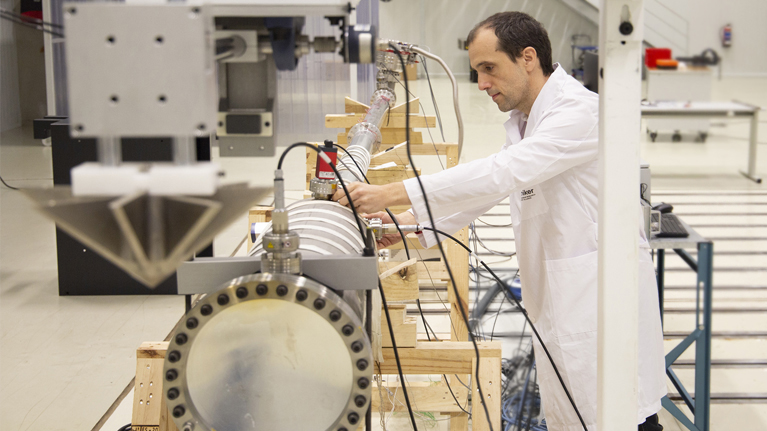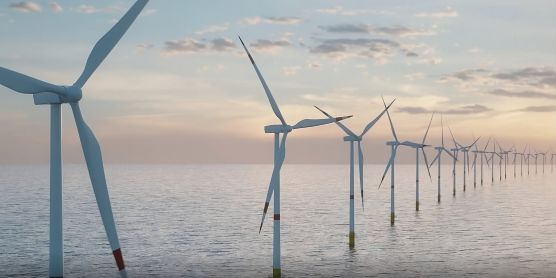A CUSTOMISED TEST BENCH TO FURTHER RESEARCH ACTIONS IN THE AREA OF NUCLEAR FUSION

Muvacas, designed and manufactured by the technology centre jointly with the University of Granada and the IFMIF-DONES Spain consortium, will make it possible to perform highly accurate experiments to validate the design of the particle accelerator to be commissioned in Granada
 Nuclear fusion consists in replicating the Sun’s atomic processes and reactions on Earth to obtain cleaner energy. Particle accelerators are the main technical tools used to investigate new materials required to manufacture fusion reactors.
Nuclear fusion consists in replicating the Sun’s atomic processes and reactions on Earth to obtain cleaner energy. Particle accelerators are the main technical tools used to investigate new materials required to manufacture fusion reactors.
It is in this context that a multidisciplinary team at the Tekniker technology centre is working to develop an innovative test bench to further energy research actions in the area of nuclear fusion.
Thanks to this experimental prototype, it will be possible to perform the tests required to check the reliability of critical elements of IFMIF-DONES, the innovative particle accelerator to be commissioned in the municipality of Escúzar (Granada).
More specifically, the equipment developed by Tekniker will allow IFMIF-DONES scientists to learn more about the behaviour of different mechanical systems, components and materials used on the particle accelerator’s line to deal with unexpected events.
The technology centre will cover all the phases of this project from design, manufacture and assemblage of the prototype to final installation work at the University of Granada with the support of AVS and TVP, two companies that will supply a number of critical components.
The technology centre will not only contribute its expertise in the domain of Ultra High Vacuum (UHV) equipment but also make available its technological capabilities related to areas such as metrology, mechatronics, surface engineering, automation and control.
As the entire system will be fully mounted by April at Tekniker’s facilities, it will not only be possible to ascertain that all components operate correctly but also obtain data instantaneously thanks to a fully automated system.
In this regard, the system has been fitted with an ad hoc network of sensors to achieve full operational speed and extensive synchronisation to meet the needs and requirements arising from the highly advanced experiments to be carried out on this installation.
Andoni Delgado, the person in charge of the Science Industry unit at Tekniker explains that “the network of sensors we have to configure for the prototype should be able to capture and analyse how the wave front advances. The wave front can reach speeds in excess of 500m/sec”.
A team made up of Tekniker researchers will assemble the equipment in the technology centre’s ultra-precision room, a sizeable space that meets all requirements with regard to humidity, temperature and cleanliness so that operations can be carried out with Ultra High Vacuum systems.
A unique project in the world
The prototype will recreate the last 30 metres of a line that connects the accelerator’s high energy beam with the lithium white chamber to perform an experimental study on the duration of wave front propagation and validate the protection systems designed to mitigate unexpected events.
The person responsible for the Science Industry unit also states that “although there are some tests performed like those that we want to reproduce, there is currently no specific in situ installation capable of replicating all of these testing campaigns that this option will provide”.
“Consequently, the repercussion of the results obtained will be a matter of great interest for the scientific community dedicated to developing particle accelerators. The knowledge acquired will also be useful in the industrial sector in areas such the manufacture of critical components and advanced sensorics”, says Andoni Delgado.
The prototype, called MUVACAS (Multipurpose Vacuum Accident Scenarios), will make it possible to adapt the design and the optimum configuration of the particle accelerator to be built within the framework of the international IFMIF-DONES initiative (International Fusion Materials Irradiation Facility – Demo Oriented NEutron Source).
The Tekniker researcher also believes that “IFMIF-DONES is a unique installation in the world that will eventually become a strategic scientific infrastructure for scientists working in the area of energy research & innovation”.
This installation, currently under construction in Granada, forms part of an ambitious EU programme aimed at developing fusion as a source of energy. It has been estimated that a budget of 700 million euros will be required to build and commission the facilities.




